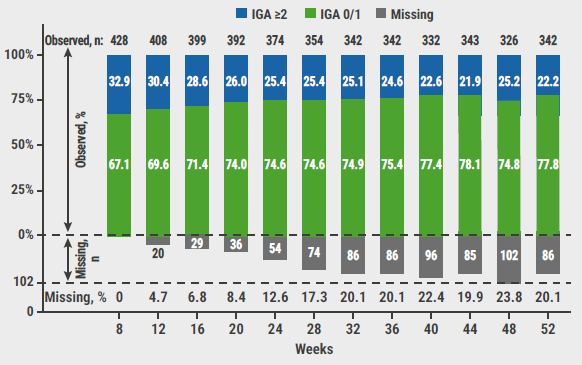https://doi.org/10.55788/10325234
Blockade of IL-22 has shown to be associated with a significant downregulation of multiple immune pathways, such as Th1/CXCL9 [1]. The expression of this proinflammatory cytokine is increased and thought to contribute to epidermal hyperplasia and barrier defects in patients with AD. Prof. Diamant Thaçi (University of Lübeck, Germany) presented the results of a phase 2a, randomised, double-blind, placebo-controlled, proof-of-concept trial (NCT04922021) to assess the efficacy and safety of LEO138559, a monoclonal antibody that specifically targets the IL-22 receptor, blocking signalling of IL-22 and potentially also IL-20 and IL-24 [2]. Included were 58 patients, randomised 1:1 to receive the agent or placebo every 2 weeks for 16 weeks, followed by a 16-week safety follow-up.
At week 16, the Eczema Area and Severity Index (EASI) change from baseline, the primary study endpoint, was -15.3 in the participants treated with LEO138559, a 65.4% improvement compared with -3.5 in the placebo group (P=0.003). “The agent really works fast,” Prof. Thaçi said. In addition, the antibody was superior regarding all secondary endpoints, namely EASI75, EASI90, and EASI100 responses and in the Investigator’s Global Assessment scale. LEO138559 also had a pronounced antipruritic effect: 20% of the participants that got the active ingredient achieved a reduction in a numerical rating scale of ≥4 compared with 7 in the placebo group (P=0.14).
The new antibody showed good tolerability with no serious adverse events and only 1 case of conjunctivitis.
- Brunner PM, et al. J Allergy Clin Immunol 2019;143:142–54.
- Thaçi, D. Efficacy and safety of IL-22R inhibition in patients with moderate-to-severe atopic dermatitis: results from a Phase 2a monotherapy trial. S042, AAD 2023 Annual Meeting, 17–21 March, New Orleans, USA.
Posted on
Previous Article
« Delgocitinib shows promise as topical therapy for chronic hand eczema Next Article
Topical roflumilast beneficial in atopic dermatitis »
« Delgocitinib shows promise as topical therapy for chronic hand eczema Next Article
Topical roflumilast beneficial in atopic dermatitis »
Table of Contents: AAD 2023
Featured articles
New Developments in Dermatology
Delgocitinib shows promise as topical therapy for chronic hand eczema
Vitiligo patients maintain re-pigmentation after ruxolitinib cream withdrawal
Nemolizumab decreases lesions and itch in prurigo nodularis
Lichen planus: a future indication for baricitinib?
Atopic Dermatitis: State of the Art
As-needed ruxolitinib shows successful long-term symptom control in AD
Dupilumab: a viable option for atopic hand and foot eczema
Topical roflumilast beneficial in atopic dermatitis
IL-22 receptor blocker reduces itch and skin lesions in AD
Psoriasis: New Developments
Switching to risankizumab successful in IL-17 inhibitor non-responders
Novel, selective TYK2 inhibitor shows promise for psoriasis
Hidradenitis Suppurativa: What You Need to Know
Izokibep shows remarkably high grades of clinical response in HS
Bimekizumab could be the new up-and-comer for HS treatment
Pearls of the Posters
Biologics in psoriasis: can they prevent joint involvement?
JAK inhibitor deuruxolitinib shows encouraging hair re-growth in alopecia areata
Biomarkers predicting response of different CSU treatments in children
© 2024 Medicom Medical Publishers. All rights reserved. Terms and Conditions | Privacy Policy
HEAD OFFICE
Laarderhoogtweg 25
1101 EB Amsterdam
The Netherlands
T: +31 85 4012 560
E: publishers@medicom-publishers.com


